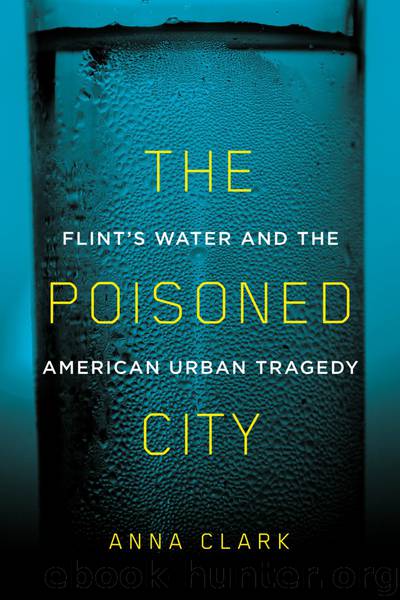The Poisoned City: Flint's Water and the American Urban Tragedy by Anna Clark

Author:Anna Clark
Language: eng
Format: epub
Tags: City Planning & Urban Development, Environmental, Environmental Policy, History, Political Science, Public Policy, Technology & Engineering, United States, Water Supply
Publisher: Metropolitan Books
Published: 2018-07-10T03:00:00+00:00
IV.
Both Mayor Karen Weaver and Governor Snyder wanted a federal disaster declaration for Flint, to go along with the emergency support—that would open the door to aid money for infrastructure. But the state’s request was denied and would continue to be denied over its appeals. The reason: federal disaster designations are earmarked for natural emergencies, such as hurricanes, mudslides, and earthquakes. Flint’s disaster was man-made. An exception had been made for Love Canal almost forty years earlier, but there would not be one for Flint. This narrow definition of what counts as a disaster was something the Kerner Report had addressed in the urban crisis of the sixties, recommending an amendment to the Federal Disaster Act to permit federal “assistance to cities during major civil disorders, and provide long-term economic assistance afterwards.”55
Still, other kinds of assistance flooded the city. As the story broke around a scandalized world, it was almost impossible to keep up with the interventions, the rhetoric, the politics, the scores of volunteers and donations and reporters pouring into town. For the first time in a long time, everyone was paying attention to Flint. In the mad rush, it was not easy to sort out the city’s allies from its exploiters; people who came humbly to help versus those who came to use Flint, and its limelight, for their own profit—selling water gadgets to fearful residents, for example, or promoting themselves and their pet projects.
The city got a star turn when the Whiting auditorium in the Cultural Center hosted #JusticeForFlint, a benefit featuring African American filmmakers and performers—among them, Stevie Wonder, Ryan Coogler, Hannibal Burress, Janelle Monae—scheduled on the same night as the Academy Awards. Some two thousand people showed up, mostly locals who received free tickets. With help from the livestream, it raised more than $150,000. Superstar Beyoncé also opened a relief fund for Flint, a move that generated $82,234 for the United Way of Genesee County. Aretha Franklin offered hotel rooms and food vouchers to displaced residents. The owner of the Detroit Pistons, a Flint native, pledged $10 million. General Motors and the United Auto Workers gave $3 million for health and education services.
Flint even became fodder for presidential candidates. Shortly before Michigan held its 2016 Democratic primary, candidates Hillary Clinton and Bernie Sanders held one of their national debates in Flint. The Republican presidential candidates faced questions about the water crisis when they debated in Detroit that same week. Several presidential prospects visited the city during their campaigns, including Donald Trump. Clinton also worked with Mayor Weaver to develop a summer jobs program that employed a hundred local teenagers.56
An abundance of federal agencies also stepped in to give Flint special assistance. There was a massive expansion of Medicaid coverage for people under twenty-one or pregnant or both (a total of fifteen thousand) who were exposed to the water, and they did not necessarily have to live in the city. Another thirty thousand received a greater range of services through Medicaid. A free Disaster Distress helpline connected callers with trained counselors.
Download
This site does not store any files on its server. We only index and link to content provided by other sites. Please contact the content providers to delete copyright contents if any and email us, we'll remove relevant links or contents immediately.
| Africa | Americas |
| Arctic & Antarctica | Asia |
| Australia & Oceania | Europe |
| Middle East | Russia |
| United States | World |
| Ancient Civilizations | Military |
| Historical Study & Educational Resources |
Cat's cradle by Kurt Vonnegut(15351)
Pimp by Iceberg Slim(14506)
4 3 2 1: A Novel by Paul Auster(12391)
Underground: A Human History of the Worlds Beneath Our Feet by Will Hunt(12097)
The Radium Girls by Kate Moore(12026)
Wiseguy by Nicholas Pileggi(5782)
The Fire Next Time by James Baldwin(5441)
Perfect Rhythm by Jae(5402)
American History Stories, Volume III (Yesterday's Classics) by Pratt Mara L(5307)
Paper Towns by Green John(5188)
Pale Blue Dot by Carl Sagan(5007)
A Higher Loyalty: Truth, Lies, and Leadership by James Comey(4959)
The Mayflower and the Pilgrims' New World by Nathaniel Philbrick(4502)
The Doomsday Machine by Daniel Ellsberg(4489)
Killers of the Flower Moon: The Osage Murders and the Birth of the FBI by David Grann(4447)
The Sympathizer by Viet Thanh Nguyen(4390)
Too Much and Not the Mood by Durga Chew-Bose(4346)
The Borden Murders by Sarah Miller(4324)
Sticky Fingers by Joe Hagan(4197)
